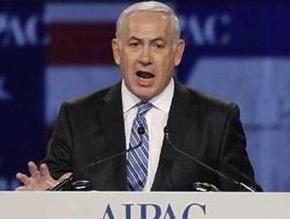|
World Jewish News

The Israeli leader received a warm welcome at the AIPAC annual policy conference, drawing cheers and standing ovations. But in the middle of his speech, a group of leftist activists heckled him and criticized his policies toward the Palestinians.
|
Netanyahu to AIPAC: Israel cannot return to 1967 lines because of its security, 'Palestinians refuse to accept the Jewish s
24.05.2011, Israel and the World In a speech to the American Israel Public Affairs Committee (AIPAC), the most important pro-Israel group in the United States, Israeli Prime Minister Benjamin Netanyahu said Israel cannot return to the 1967 borders because it must be mindful of its security.
“Tomorrow in Congress, I'll describe what a peace between a Palestinian state and the Jewish state could look like. But I want to assure you of one thing. It must leave Israel with security. And therefore, Israel cannot return to the indefensible 1967 lines,” he said.
The Israeli leader received a warm welcome at the AIPAC annual policy conference, drawing cheers and standing ovations. But in the middle of his speech, a group of leftist activists heckled him and criticized his policies toward the Palestinians.
The hecklers were escorted out by security as other members of the audience cheered loudly. Netanyahu made light of the interruptions and asked, "Do you think they have these protests in Gaza?".
Netanyahu is also likely to receive a warm greeting by members of Congress on Tuesday, where he has strong bipartisan support.
In his speech he said “we want peace because we know the pain of terror and we know the agony of war. We want peace because we know the blessings peace could bring - what it could bring to us and to our Palestinian neighbors.”
“But if we hope to advance peace with the Palestinians, then it's time that we admitted another truth. This conflict has raged for nearly a century because the Palestinians refuse to end it. They refuse to accept the Jewish state.”
Last week, in a major policy speech at the State Department, US President Barack Obama raised the issue of borders between Israel and a Palestinian State, stressing that final borders must be based on the 1967 lines. He made it clear that this had to include “mutually agreed swaps, so that secure and recognized borders are established for both states.”
But on Sunday, in an address to AIPAC, Obama sought to clarify what he had meant regarding the 1967 borders.
“By definition, it means that the parties themselves – Israelis and Palestinians – will negotiate a border that is different than the one that existed on June 4, 1967,” Obama said. “It allows the parties themselves to account for the changes that have taken place over the last 44 years. It allows the parties themselves to take account of those changes, including the new demographic realities on the ground, and the needs of both sides.”
More than 10,000 pro-Israel activists from all 50 US states are filling the halls of the Washington Convention Center for this year AIPAC conference, the largest in the organization’s history.
The theme for this year's conference is "U.S. and Israel: Better Together."
Except for the State of the Union address, the AIPAC policy conference is the largest annual bipartisan gathering of U.S. senators, representatives, administration officials, diplomats and foreign ambassadors.
EJP
|
|
